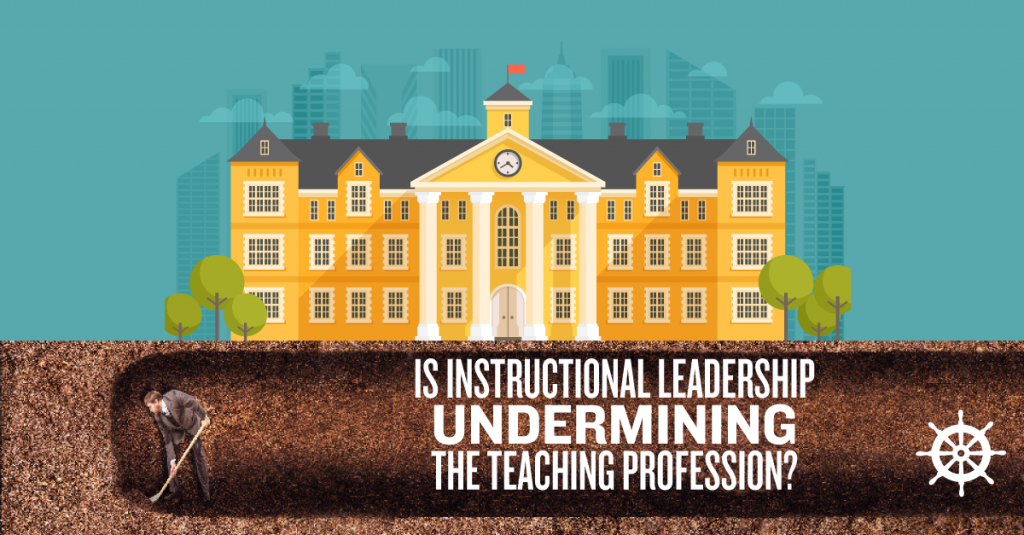
I'm proud to be a proponent of instructional leadership. So far, we've had over 9,000 leaders from at least 50 countries go through the Instructional Leadership Challenge.
But the bigger the banner, the more it starts to encompass misconceptions and distortions. And I had a terrifying thought this morning:
What if the surge of interest in instructional leadership is actually undermining the teaching profession?
What if, in our efforts to improve the teaching profession, we're driving out precisely the kind of professionals we need?
Olden Days and Elite Ways
There was once a time when principals were expected to be managers, but not instructional leaders.
Teaching was for teachers, and as long as they were relatively competent, they were best left alone.
The flaws in this mindset are obvious—teaching is a complex profession, and strong instructional leadership has a powerful impact on the quality of instruction. That's been firmly established for several decades now.
But this “outdated” division of labor lives on in a surprising place: elite schools.
At The Principal Center, we serve public, charter, private, parochial, and international schools (which is why we're in so many countries), and I've noticed a pattern.
By and large, public schools have made major changes in the way they evaluate teachers and they way they define the role of the administrator as an instructional leader. If you even hint that you want to be a manager—that instructional leadership isn't your top priority—you'll never get a job in any major public school district in the US.
But in elite schools, teacher professionalism is viewed differently—closer to the way tenured faculty are viewed at the university level.
I did some consulting with an elite boarding school in Pennsylvania a few years ago, and I was struck by the degree of autonomy afforded to teachers. They made decisions fearlessly—like professionals—without feeling the need to run everything by an administrator. I liked it.
Yet, while clearly skilled professionals, these teachers weren't any better-prepared or more up-to-date than many of the teachers you'd find in any public school. If anything, they were free to remain a bit more traditional in their practices, due to their relative lack of struggling students.
If this degree of professional respect for teachers is good enough for our nation's most elite private schools, why isn't it the norm in public schools?
The answer is simple: because traditional practices aren't up to the challenge of meeting the needs of all students.
Enter: strong instructional leadership.
The Charter Revolution
Instructional leadership as a force for improvement comes primarily from the charter school world.
Teach Like A Champion? Charter.
Leverage Leadership? Charter.
Driven by Data? Charter.
Teaching As Leadership? Charter.
You get the idea. And so have public schools, which are increasingly adopting the charter world's “no excuses” approach to instructional leadership, which features:
Intensive administrator-driven coaching Extensive use of data by teachers and leaders Ultra-specific expectations regarding curriculum and instructional strategies
While I think this has mostly been a good change, I'm a bit concerned by its impact on the status of teaching as a profession.
To be blunt, teaching is being reduced to an entry-level job. And that's a tragic mistake.
Just look at the title of Doug Lemov's latest book: Get Better Faster: A 90-Day Plan for Coaching New Teachers.
I don't have a problem with helping teachers get better faster. That sounds like a good idea.
But this innocuous title reveals the charter world's dirty little secret: teaching isn't seen as a profession. It's treated like an entry-level job.
In a profession, you invest in preparation. (Medical school is four years long, not including residency.)
In an entry level job, you invest in training, because the professional skill and judgment of your employees can't be assumed.
Now, I understand why the charter movement has taken this tack: it's hard to attract highly skilled veteran professional teachers to struggling schools.
It's easier to attract energetic young people who are eager to commit to a cause.
And if you're working with new teachers, they certainly need a different kind of instructional leadership than skilled veterans.
And this is where instructional leadership is going off the rails: we're treating everyone—including skilled professionals—like clueless kids fresh out of college.

Thanks for article. Nice post!